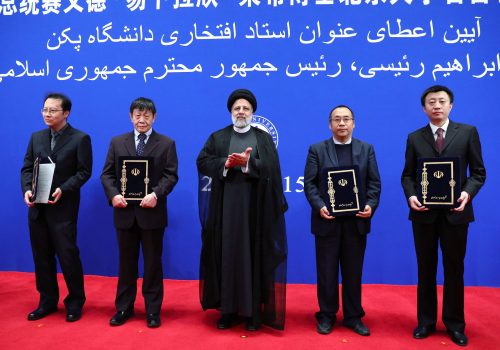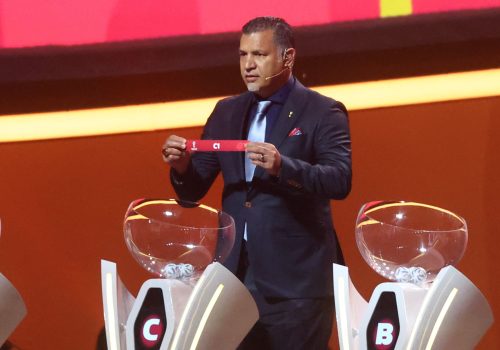There’s a Forex market crisis in Iran. The root cause of its problems is the clerical establishment.
Iran’s foreign exchange rates reached all-time highs on February 26. The exchange between the US dollar and the Iranian rial (IRR) has gone from 260,000 to over 550,000 rials in the past year, a devaluation of more than 55 percent. For Iranians, the sharp increase in exchange rates is nothing new.
During the past few decades, the country has seen numerous increases in exchange rates. In the forty-four years since the founding of the Islamic Republic, the US dollar (USD) to IRR rate grew from 7 IRR/USD to 50,000 IRR/USD, with significant price spikes in between. Yet, Iranian officials have not been able to stop the increases in foreign currency rates or maintain the value of the Iranian rial.
There are several factors corresponding to the ever-growing foreign exchange rates in Iran. First, the country experienced double-digit inflation after the Islamic revolution in 1979, with the exception of four years in 1985, 1990, 2016, and 2017. Higher inflation results in a lower value of the Iranian currency, or, in other words, higher prices for the US dollar and other foreign rates in the market.
Numerous factors—from economic sanctions to wrongdoing by policymakers, such as excessive expansionary monetary policies prior to elections—have contributed to high inflation rates in Iran over the years. One main factor is the massive budget deficits that forced the government to take extraordinary actions, such as liquidating public assets in February. However, high inflation in the country cannot explain the rapid increase in exchange rates during the past several months because inflation did not rise as quickly as foreign exchange rates did.
In other words, inflation explains long-term variation in foreign exchange rates better than the short term. It is also important to keep in mind that increased exchange rates may cause inflation to rise since imported items cost more. Yet, the pass through of currency rates is not the leading cause of Iran’s high inflation rate. Sound monetary policies are required for long-term IRR value preservation and inflation management. Yet, unfortunately, the Central Bank of Iran (CBI) has struggled badly to contain inflation over the years due to mismanagement and inept policies. As a result, it is unlikely that the country would experience a consistent decline in foreign exchange rates.
Additionally—and maybe more crucially—expectations have a significant impact on foreign currency rates and explain their variation better in the short term. Following the death of Mahsa Jina Amini in police custody in September 2022, demonstrations calling for regime change have persisted in almost all regions of the country. The talks to revive the nuclear agreement were stalled prior to the protests, and numerous US and European Union (EU) sanctions were imposed on Iranian officials and entities violating human rights in Iran. This was also followed by the EU imposing new sanctions on Iran as a result of Tehran’s export of kamikaze drones to Russia in the Ukraine war. The new US and EU sanctions will further impact the Iranian trade balance and increase capital outflow.
As a result of no optimistic outlook and a loss of faith in the clerical establishment to solve domestic and international problems, long queues were formed to buy foreign currency. Iranians want to buy foreign assets and currencies to maintain the value of their assets, as they do not perceive any favorable trends in the economy. This expectation by people and investors counts the most in explaining the sharp rise in exchange rates in the market over the past few months.
Hence, as more people believe that Iranian officials are incompetent at solving domestic and international tensions, more people lose faith in the Iranian currency and change it to other assets or currencies to preserve the value of their savings. By contrast, on March 10, the China-mediated agreement to restore diplomatic ties between Iran and Saudi Arabia sent a positive signal to the market, halting the increase in exchange rates and lowering them significantly. The Iranian currency market is highly sensitive to news and expectations. If people do not see an optimistic outlook for Iran’s economy, exchange rates will rise again, despite a few agreements with governments such as Saudi Arabia.
Instead of addressing economic concerns, Iranian officials responded to the crisis in the foreign exchange markets by worsening the situation. The Ebrahim Raisi government’s initial response to increases in foreign exchange rates was to arrest market participants and lay the responsibility for the market’s instability at their feet. It is erroneous to attribute blame for the problems in the forex market to those who merely participated in the market without having any roles in making decisions. They were detained after being identified as the “Kings of the Dollar” and were accused of causing unrest and corruption in the market. Rather than using any economic approach, the government tried to stabilize the market through fear, which never works.
Generally, when the foreign exchange market continues to climb, the government replaces the chairman of Iran’s central bank to demonstrate that the new chairman will be able to stabilize the market. This occurred in December 2022 when Mohammad Reza Farzin was appointed as the new chairman of the central bank. He oversaw Iran’s subsidy reform act during the Mahmoud Ahmadinejad administration—an act that presented the Iranian economy with numerous difficulties and put it on the path it is today. The central bank’s reputation was harmed by the remarks of its governor regarding rate regulation, which not only brought stability to the market but also exposed the inefficiency of the central bank’s actions.
Iran’s president directly appoints the head of the central bank, who lacks any discretion. In order to pursue market operations, manage inflation, and stem the rise in foreign exchange rates, the confidence of the market in the central bank is essential. Because of the tasks that the government has assigned to the central bank, it not only has to perform what the government tells it to do but also lacks autonomy in pursuing monetary policies. According to the impossibility trinity in international economics literature, the central bank loses its autonomy in the market if it employs capital control policies and a fixed exchange rate regime, which the central bank of Iran does. Thus, it appears that the Iranian central bank, a body in charge of monetary policies, lacks the credibility and independence to resolve crises involving foreign exchange rates and manage inflation.
Economic factors alone cannot solve the current forex market crisis. The country’s economic structure, persistent economic problems brought on over time by Iranian policymakers, and, more importantly, the crisis in Iran’s domestic and foreign policies are the causes of these problems. Although it may slow down or stop for a while, the rise in exchange rates is inevitable given the state of the economy, which will only increase the suffering of the Iranian people.
Ebad Ebadi holds a PhD in Economics from George Washington University. He has taught economics at George Washington University and Tehran University, and worked for organizations and institutions both within and outside of Iran. Follow him on Twitter: @ebadi_ebad.
Further reading
Wed, Feb 22, 2023
Iran’s economic future is uncertain. It’s no surprise why Raisi visited China.
IranSource By Jonathan Fulton
From February 14-16, Iranian President Ebrahim Raisi was in Beijing for his first foreign trip of the year and the first official visit to China for an Iranian leader in twenty years.
Wed, Jan 11, 2023
Soccer players versus the IRGC. Who do the people of Iran choose?
IranSource By
Iranians know who their national heroes are.
Wed, Aug 3, 2022
Amongst Iran’s super-rich are tax evaders too. And the government isn’t doing much about it.
IranSource By
Given Iran’s economic crisis, there is widespread public resentment of the ability of the super-rich to avoid paying taxes.
Image: An Iranian man walks past a currency exchange shop in downtown Tehran on August 30, 2021. Iran's troubled currency fell to a record low against the U.S. dollar on Saturday January 21, 2023, amid the country's increasing isolation and possible Europe Union sanctions against Tehran's Revolutionary Guards or some of its members. Photo by Ali Shaeigan/Parspix/ABACAPRESS.COM


